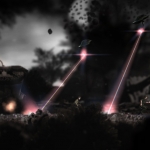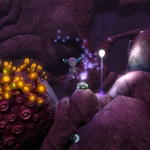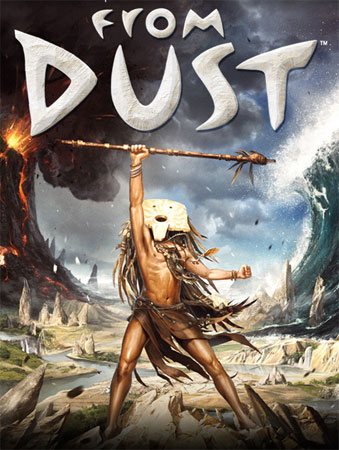
If you’re part of that subset of sim gamers who have been longing for a new god game, Ubisoft has good news for you. From Dust released on the Xbox Live Arcade last week as the second entry in this year’s Xbox Summer of Arcade promotion, and it scratches an itch that has been largely neglected for quite a while.
God games are, at their core, artificial life simulators that place nearly unlimited power into the hands of the players. 1989’s Populous is the traditional go-to title for the genre, but there have been numerous efforts since then, including Black & White, SimEarth, and, most recently, Spore. From Dust is a spiritual successor to Populous, and as such finds itself firmly rooted in many of the tricks of the trade that make that game the pinnacle of the genre.
The game opens with a tribe of people beginning a journey in search of their lost Ancients. The Ancients are absent from the world but left monuments behind for the people to find as a sort of system of guide posts. This sets up the goal for each level of the game, as you must guide your traveling villagers from land to land by making sure they survive the ever increasing perils set before them by the very world itself. Boiled down to the very basics, each level of From Dust is a puzzle requiring that the tribe make its way to a series of totems in order to unlock the exit to the next level, through which they then must pass. The actual mechanics of getting them to do this is a lot more complex.
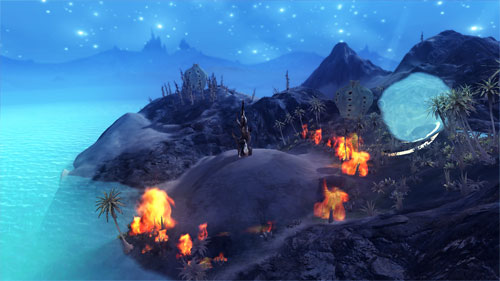
The game board in each level is a beautifully rendered landscape, lushly detailed with rolling hills, steep mountains, and verdant vegetation. Everything isn’t hugs and puppies, though, as the world becomes more hostile with each level, introducing volcanoes, tsunamis, and trees that occasionally spontaneously combust. With such varied features in the landscape, the world itself is the antagonist, trying to thwart the poor villagers’ progress at every turn. As their deity, you will modify the land and make obstacles passable for at least long enough for them to make their precarious ways to each waypoint.
As the deity, you possess the power of the Breath, allowing you to suck up nearly anything on the landscape and then blow it back out wherever you want. The left and right triggers control the Breathing in and out, and you can disperse the entire contents of your current Breath, or you can drop it out piecemeal, all tweakable with the triggers. The Breath really is a mighty tool. At its most basic function, you can grab up orbs of dirt and drop them in water to create land bridges across streams. As the puzzles become more complex, you’ll be using the Breath to do things like suck up lava to drop into water to create rock walls. The land and elements behave uncannily well, and it’s really awesome (albeit occasionally frustrating) to watch the dirt dam you just created crumble and wash away in a flow of water that is too strong for it to hold.
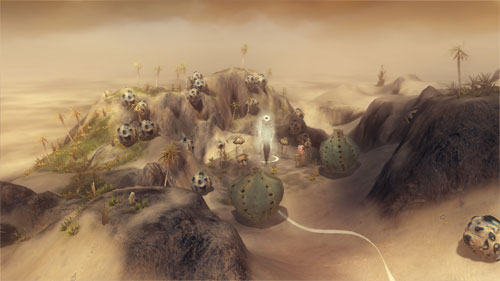
Since the land reacts in real time, some of the paths you create for the villagers will be temporary fixes to ongoing problems. You might be able to divert the flow of a massive river for a minute or two, but eventually the water might reclaim the momentarily safe path. In situations like this one, you’ll have to rush your folks along to their destination before the world smites them in a mighty wave. There’s a neat synergy to the game that establishes predictable patterns in the way nature reacts to what you’re doing. At some point you’ll transition from having to rush to save your people in a panic to finally being able to develop sound strategies to get them safely to where they need to go.
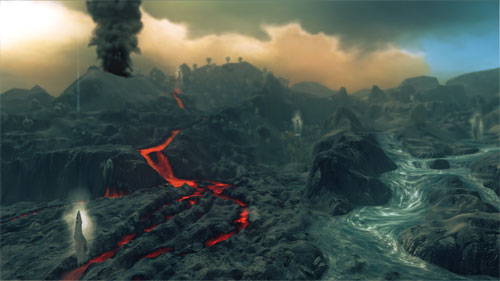
The tribes establish villages whenever five people reach a totem, and occasionally these villages will unlock new abilities you can use to help them further along the map. The abilities include powers like “jellify water” or “evaporate.” Each power is on a timer and will allow you to modify some element all over the map for a brief period of time. Using the right powers in conjunction with the Breath at the right time becomes essential in later levels.
As you complete each level, you’ll open new challenges that play separately from the main narrative. Each challenge sets up a specific goal you must accomplish, and it establishes specific parameters within which you must do it. The limitations and requirements in the challenge mode present some really unique and fun puzzles that deviate from the patterns of the main game.
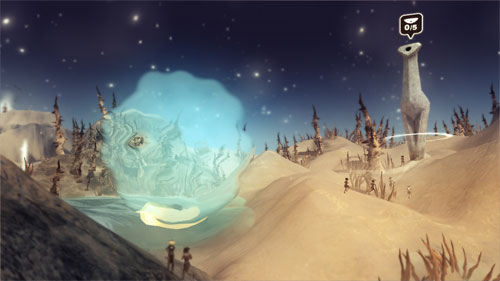
From Dust is a strong entry into the Summer of Arcade promotion and lives up to the hype. It’s priced at 1200 Microsoft Points, which is a steeper price tag than I usually like for downloadable games. It really delivers its value, though, and it has a lot of staying power as you’ll want to replay levels and challenges either to perfect your strategies or just to monkey around with a world.


